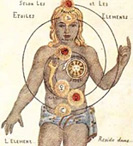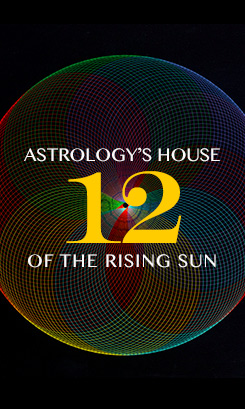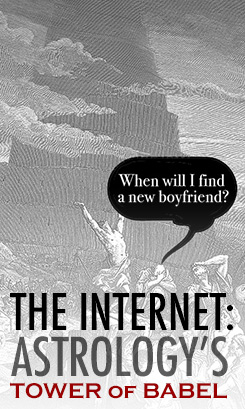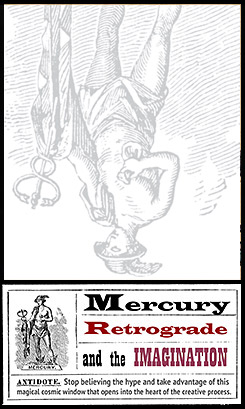Horoscope Reviews My New Book Skywriter
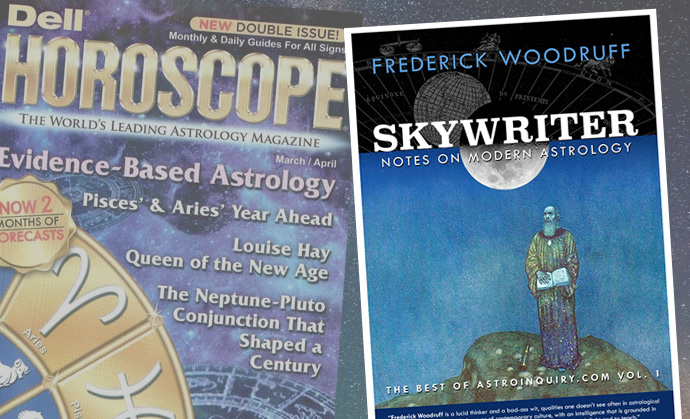
Astrology claimed me in the mid-70s when I was a kid. As far back as I can remember our home was stocked with Horoscope magazines. You’d find issues — current or older — in every location of the house. Consulting the stars was an impulse that might overtake you at any moment! I clearly benefited from my mom’s oracular fascination.
From Horoscope, I found my way to my teacher, Ivy Goldstein-Jacobson. And then — pow — 45-years zipped past. And here I am compiling this post. It’s uncanny and humbling to have come full circle. Meaning, the new issue of Horoscope contains reviewer Chris Lorenz‘s comprehensive look at my new book Skywriter: Notes on Modern Astrology, sections of which I’m highlighting below. What a wonderful time-cycle this has been.
It’s a testament to Horoscope‘s keen-eyed editor Ronnie Grishman that — in the age of what I call ‘hypermedia’ — the print version of the magazine continues to roll off the presses and find its way into homes across the globe. And into the hearts of the next generation of astrologers. You can subscribe to Horoscope here, either in its print or electronic version.
Skywriter: Notes on Modern Astrology by Frederick Woodruff
The growth of the Internet and social media over the last few years has had a dramatic influence over the astrological community, which collectively has expanded exponentially in recent years. Nowadays, anyone interested in astrology may feel she has no one to talk to in the local community, but readily finds a treasure trove of astrology-based websites to read online and engaging conversations within social-media groups.
Frederick Woodruff finds the Internet a frequent foil in his collection of fifteen essays, Skywriter, Notes on Modern Astrology. Other essay subjects include discussions on Pluto, Mercury retrograde, and even a few non-astrological topics of interest to those living in the Age of the Internet.
Although his essays are wide-ranging, he does come from a specific psychological, philosophical viewpoint that shapes the content of his musings and criticisms. His most frequently quoted source of authority is G. I. Gurdjieff, the early twentieth-century mystic.
Gurdjieff’s primary mission was to awaken his students’ relationship to their bodies. The body has its own wisdom, which is an extension of the earth’s body and wisdom. For those who spend so much time on their cell phones or surfing the Net, Gurdjieff’s teachings are a bit off the beaten track. Yet, getting into a body-based perception is exactly what Woodruff advises in many of his essays.
In “Create Your Own Archetype and Call It You,” he writes: “You can have a direct perception, a sense-based recognition of astrology’s veracity by simply being in your body and registering what you experience as astrological truths (or fallacies). Not enough astrologers write and teach from direct, body-based knowing.”
Getting into this body-based knowing is the solution to a variety of problems faced by many well-meaning astrologers, especially those populating the Internet. Several essays contemplate the astrologer’s place on the web, including “Make Facebook your Slave — Some Tips,” “How to Stop Self-Helping Yourself into Oblivion,†and “How to Write about Astrology (Or Not).”
But perhaps the most notable is titled, “The Internet: Astrology’s Tower of Babel,” which decries how the quality of astrology has actually fallen over the last fifteen years due to social media and its appeals to like-ability.
Woodruff offers three fundamental problems related to the Internet. The first is apparent to anyone with a decent understanding of astrology’s basic principles: the many poorly schooled astrologers who can broadcast their writings or videos “into the chaotic free-for-all of the Internet.”
Second is the pervasive advice to those with low self-esteem about how to improve their love lives. (Yes, this stuff is everywhere).
And third, the search logarithms reward sites with high click volume, “and those sites are commercial enterprises acclimated to the shrill standards of the carnival culture.”
Woodruff doesn’t see any resolution to the problem of “the gypsy-like dazzle of con-artistry” that is causing astrology to lose its place in public standing; however, he does promote a better way to express astrology’s essential function, “which is to act as a kind of poetry and dialogue that the astrologer arranges so his client might converse with the cosmos via her imagination, dreams, and intuition.”
He lauds the revival of astrology during the 1960s when Uranus and Pluto were conjunct in earthy Virgo. This reflection resonates with Gurdjieff’s teaching, that the ’60s revival was fueled by an organic, pagan-like veneration of nature, the body, and the senses.
Although only a few of his essays infer the author’s preferred school of thought, he does admit to an admiration of John Frawley and his adherence to classical astrology. Following the work of seventeenth-century astrologer William Lilly, Frawley has no use for the outer planets. Woodruff quotes Frawley at length, including this passage: “The workings of the traditional system are based on light and providential appearance of the Heavens to the naked eye: a planet with no light has no power … Light is the visible manifestation of truth, the substance of creation. These objects lack it and are irrelevant to us.”
Consequently, in his essay on “Depression and Solar Consciousness.” Woodruff writes about how we are bookended between the Sun and Saturn, which defines our life’s narrative. He gives traditional astrology a modern spin by advocating spiritual psychology. Accordingly, we are limited by our relationships to our parents and consensus reality but gifted by Saturn with depression to urge us beyond.
Similarly, in “Final Notes about the Final Uranus Pluto Square,” he spells out how the outer planets move us beyond Saturn’s limitations. “If you are committed to upholding the values and standards you inherited from your family, church, or the various authority figures that influenced your life, well, it’s likely that your ability to find resonance with the outer planets hasn’t developed.”
Woodruff describes how his brand of spiritual-psychological astrology helps advance consciousness in the Age of Facebook. His criticism is often harsh and direct: “The Internet has fostered a free-for-all for imbeciles, don’t support their buffoonery.” And his precious tips for becoming a better astrology blog writer will help improve the astrological community’s overall standing.






